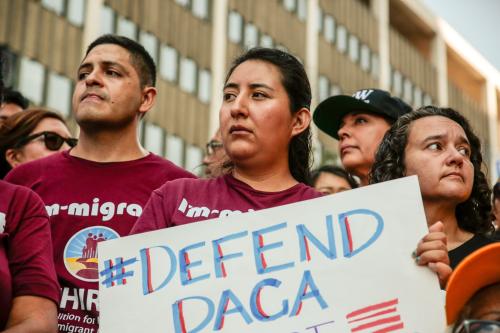This week, President Trump initiated significant immigration policy change.
Sort of.
Mr. Trump made the decision to rescind DACA, Deferred Action for Childhood Arrivals, an Obama Administration executive action that would protect certain undocumented immigrants who arrived in the U.S. as minors from deportation and allow them to apply for a work permit. The decision strikes at the heart of American values and ideals, contradicts some of the president’s campaign trail rhetoric, and carries with it a price tag that should give pause to the most conservative, values-voter Republican.
Before jumping into dollars and cents, let’s consider the most important price tag: the human cost. Those eligible for DACA, often called “Dreamers,” registered with the U.S. Department of Homeland Security. The rescission of the program means the government can easily identify this group of undocumented immigrants, target them for deportation, and enforce the law. Ironically, given that Dreamers’ parents were ineligible for protection under DACA, it may be easier for immigration officials to target Dreamers than their parents. This would mean splitting up families, sending young people back to countries they may have never known, and moving productive members of American society out of the economy.
Dreamers are young, have not committed a crime while in the U.S. and often, the only place they know to be home is the United States. Their only “crime” was accompanying their parents who opted to enter (or remain in) the U.S. illegally.
In addition, Dreamers of working age are employed (over 90 percent) and are paying taxes, while remaining ineligible for some of the same government benefits to which citizens are entitled (such as food stamps and Medicaid). Deportation of Dreamers will mean reduced productivity and reduced tax revenue at the federal, state and local levels. According to a 2017 study from the Institute on Taxation and Economic Policy, Dreamers pay as much as $2 billion annually in taxes.
Finally, the administrative and functional costs of deporting Dreamers would be staggering. As we have written previously, the average cost to Immigration and Customs Enforcement (ICE) from arrest to removal of an undocumented individual is $12,500. Deporting the approximately 800,000 Dreamers would cost the government nearly $10 billion. For perspective, the annual budget for ICE is just over $5 billion. Not only would it cost exorbitant amounts of taxpayer dollars to deport all of the Dreamers—or any significant number of them—but the opportunity costs should alarm the president, his administration, and the average American. Every dollar spent to deport Dreamers is a dollar not spent enforcing immigration laws against individuals who knowingly and purposefully entered the U.S. illegally, individuals engaged in drug or sex trafficking, and undocumented individuals committing serious felonies.
The choice to deport Dreamers may seem like an easy way to serve up some red meat for the anti-immigration base of the Republican Party and the white nationalist elements of the Trump coalition. The reality, however, is that the decision is fiscally irresponsible, functionally impossible, culturally insensitive, and politically unpopular.
The president recognized that his decision faced significant opposition beyond his base and among the majority of Americans—Democrats, Independents, and Republicans alike. He did not even have the resolve to announce the decision himself, punting instead to his Attorney General. Then in the face of the public outcry, and in contradiction to suggestions that Obama’s DACA order was unconstitutional, the president tweeted that if Congress does not address the issue, “I will revisit the issue!”
President Trump clearly needs some guidance. So, here is some advice from on High:
Mr. Trump said in 2015 that his favorite book is the Bible. As his administration works through the six-month window before DACA is repealed, the president should re-read the Old Testament. Deuteronomy will tell him:
The Lord your God is the God of all gods and Lord of all lords, the great, the mighty, and awesome God who doesn’t play favorites and doesn’t take bribes. He enacts justice for orphans and widows, and he loves foreigners, giving them food and clothing. That means you must also love foreigners because you were foreigners in Egypt.
The Brookings Institution is committed to quality, independence, and impact.
We are supported by a diverse array of funders. In line with our values and policies, each Brookings publication represents the sole views of its author(s).












Commentary
The mind-boggling cost of DACA repeal
September 7, 2017